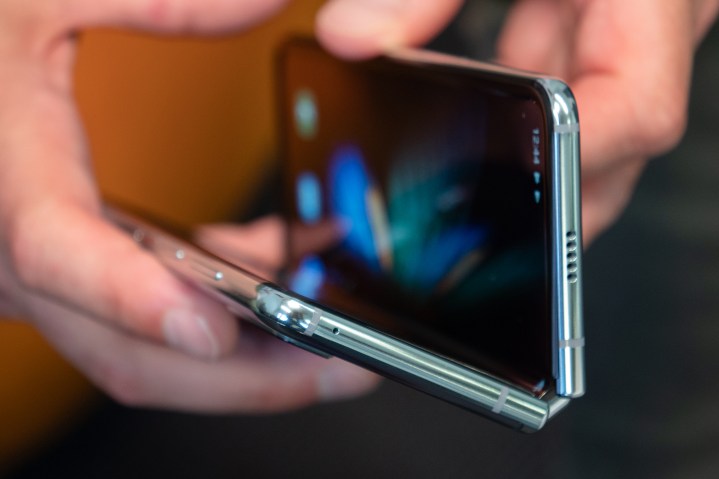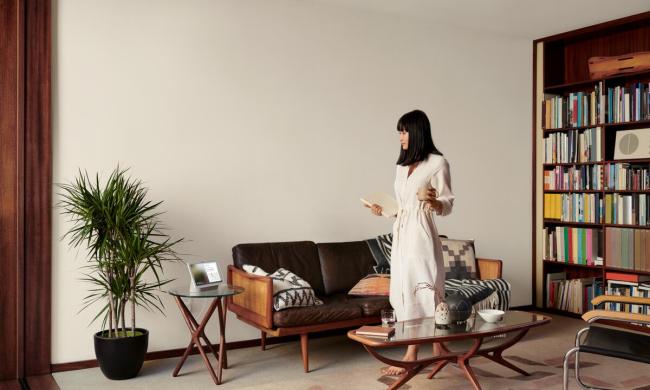The smart speaker business is brutal. Even the mighty Apple continues to lag behind the trailblazers in the space. Amazon and Google have a deep foothold in the U.S. market thanks to a wide range of offerings, with no indication of that changing anytime soon. And then there’s Samsung, which had ambitious plans to deliver its Bixby-powered Galaxy Home speaker sometime in 2019 — but things didn’t pan out that way.
The Samsung Galaxy Home, initially pegged for a spring 2019 release, was a no-show in 2019, emphasizing what we already knew about the premium segment of the smart speaker market — it’s tough to crack. It’s now been more than a year since the speaker’s initial announcement, but despite its long-standing tease of “coming soon” on Samsung’s own landing page, it may be a good thing that it hasn’t been released yet.
Bigger problems to worry about

When you’re a force in the tech space, all eyes are on whatever you do, especially when it comes to making firm commitments. Samsung’s inability to deliver the Galaxy Home in 2019 may actually turn out to be positive. For starters, the company had other priorities to worry about — like getting the issue-plagued Galaxy Fold smartphone corrected in a timely manner.
Of course, this isn’t the first time the company has faced adversity. The exploding battery issues with the Samsung Galaxy Note 7 a few years back proved to be a hard lesson learned, but that experience played a major role in getting the Fold patched up in a shorter period of time. Problems are unpredictable, making it extremely difficult to follow up on previously set deadlines, like the Galaxy Home’s initial slated release of spring 2019. Instead of moving forward with an unfinished product to meet a deadline, Samsung was wise to eventually delay the speaker indefinitely to “refine and enhance the Galaxy Home prior to launch.”
A pivot toward home security
The Samsung Galaxy Home’s release is still up in the air, but in the time between its initial announcement and now, its competition released new models that go beyond their base functions. Google announced that its smart speakers will be leveraged as security devices that will listen for emergency sounds at home, like glass shattering or smoke alarms going off. Amazon’s line of smart speakers, including its latest one, the Echo Studio, can all do the same thing by enabling Alexa Guard.

In addition to playing music and controlling various smart home gadgets, today’s smart speakers are increasingly being leveraged for home security. Since the Galaxy Home is designed to function as a SmartThings hub, you can expect a certain degree of smart home control, but it’s unknown if it’ll function as a security-monitoring device like its contemporaries. Samsung could very well surprise us with some sort of security features, given the extended amount of time spent on enhancing the speaker. If not, it’ll have less ammo in trying to convince consumers to choose it over others.
It’s perfectly fine to start small

I’ve said it before, I’ll say it again. Samsung would be wise to enter the smart speaker market with a more affordable offering, something that would better entice consumers. We already know that beta testers in South Korea have been using the Galaxy Home Mini since the fall, and considering it’s probably going to sell at lower cost than its larger sibling, it’s a safer approach to the smart speaker market.
Why risk the possibility of alienating a larger number of consumers with a potentially higher-priced smart speaker that may not be quite as capable? For Samsung, it’d be wise to start small and introduce consumers to a more budget-friendly speaker — just to gauge the level of interest. The investment involved isn’t going to be quite as substantial with the Galaxy Home Mini, so it makes more sense to go this route.
Looking ahead
Apple knows very well how difficult it is to tackle the smart home. The HomePod is evidence of that reality, one that has shown us that even the best companies can falter in new areas of opportunity. This all ties back to the Galaxy Home’s no-show in 2019. It’s a bummer for Samsung, but not for consumers. And frankly, that’s a good thing because the bar has been raised so high that we have higher expectations for the next big thing. Who knows what 2020 will bring. Perhaps a refined v2.0 of the speaker with even more features in a package that’s more pleasing to the eye? We’ll find out soon enough.



